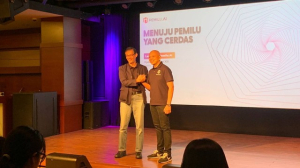AI effects, jobs lost and the need for workers to adapt
As the world is anticipating the potential of 85 million jobs lost by 2025 amidst aggressive invasion of Artificial Intelligence (AI) and technological advances, global workforce, in particular Indonesian workers, need not to stand still, but positively respond to this unavoidable global phenomenon.
"Our main challenge is to prepare a strong and competent workforce to compete in the digital era. Although some jobs may be reduced due to automation and artificial intelligence, there will be many opportunities in new sectors that are growing," Jenny Lee, Chief Executive Officer of the International Test Center (ITC), spoke to Indonesia Business Post on the sidelines of the ITC Leadership Conclave 2024 event in Jakarta on Thursday, October 17, 2024.
International Test Center is a company engaged in improving the quality of individuals and institutions in Indonesia through knowledge and related learning services.
Jenny was of the opinion that in response to the challenges of an increasingly complex world of work, increasing human capital is non-negotiable. She said the Indonesian workforce needs to be adaptive towards global dynamics and rapid technological developments.
Meanwhile, President of Collaborative Research and Industrial Innovation in Artificial Intelligence (KORIKA), Prof. Hammam Riza, emphasized the importance of strong and innovative leadership amidst rapid technological developments and complex global changes.
“Skills enhancement and training are essential to ensure that the Indonesian workforce remains relevant amidst technological developments. We must prepare workers to fill new positions that require digital skills. Through training and skills enhancement, we can address the existing technology gap,” Prof. Hammam said.
He also emphasized the importance of the concept of “reverse mentoring” where the younger generation provides learning to seniors, creating better synergy between generations.
“We often hear the baby boomers generation speaking about ‘gaptek’ or technology illiteracy. But that shouldn't exist anymore. That's why leader has to create and develop human resources through training, reskilling and upskilling,” Prof. Hammam concluded.
Already have an account? Sign In
-
Start reading
Freemium
-
Monthly Subscription
30% OFF$26.03
$37.19/MonthCancel anytime
This offer is open to all new subscribers!
Subscribe now -
Yearly Subscription
33% OFF$228.13
$340.5/YearCancel anytime
This offer is open to all new subscribers!
Subscribe now






